2024 News & Events
Congratulations to Dr. Flavia Vitale who is the 2024 recipient of a National Science Foundation (NSF) CAREER Award!
 Dr. Vitale's work at Penn Engineering entails developing accessible and affordable solutions for the diagnosis, treatment and rehabilitation of people with neurological disorders. This CAREER Award will support her lab's current research in leveraging innovation in materials and fabrication approaches to develop devices that are able to interface with and control different chemical and electrical signals inside the brain. Read more at Penn Today & Penn Engineering Today!
Dr. Vitale's work at Penn Engineering entails developing accessible and affordable solutions for the diagnosis, treatment and rehabilitation of people with neurological disorders. This CAREER Award will support her lab's current research in leveraging innovation in materials and fabrication approaches to develop devices that are able to interface with and control different chemical and electrical signals inside the brain. Read more at Penn Today & Penn Engineering Today!
July 17, 2024
Dr. Yvette Sheline's aiTBS therapy study for bipolar disorder featured on Penn Today
Dr. Yvette Sheline was featured in a Penn Today article titled "New form of repetitive magnetic brain stimulation reduces treatment time for bipolar disorder." Dr. Sheline discusses how accelerated intermittent theta burst stimulation (aiTBS) therapy can be used for depressed patients with bipolar disorder who may not respond well to drugs or cannot tolerate their side effects while also shortening the treatment window.
June 5, 2024
National Institute of Mental Health Research Highlight: "Noninvasively Stimulating Deep Brain Areas to Treat Depression Symptoms"
Drs. Desmond Oathes, Yvette Sheline, and the Center for Brain Imaging and Stimulation were featured on June 5th in a research highlight titled "Noninvasively Stimulating Deep Brain Areas to Treat Depression Symptoms." A neuroimaging study funded by the National Institute of Mental Health explored whether a brain stimulation therapy known as repetitive transcranial magnetic stimulation (rTMS) could target regions deep in the brain via their surface connections. The study offers new evidence that stimulating deeper brain areas can reduce depression symptoms and identifies a possible target for improved depression treatment. Click here for more!
MindCORE/brainSTIM Seminar: Katherine Dunlop
Date: November 1, 2024
Speaker: Katherine Dunlop, Department of Neurosciences and Clinical Translation, Keenan Research Centre Centre for Biomedical Science, St. Michael’s Hospital, Toronto
Description: Aging and the Depressed Brain
Healthy aging is characterized by cognitive decline and alterations in brain structure and function. Deviations in the rate of decline in these areas may reflect accelerated aging, potentially predicting illness risk or poor prognosis. Individuals diagnosed with major depression experience a more rapid cognitive decline alongside changes in brain structure and function. However, interpreting age-related decline in this population is complicated by significant symptom and clinical heterogeneity.
My research leverages large, densely phenotyped clinical cohorts to better understand this heterogeneity, with the goal of developing precise and effective clinical interventions. In my talk, I will explore the cognitive and neuroimaging correlates of aging, and how they are altered in the context of depression. I will highlight novel applications of brain aging to understand age-related factors in depression, with a focus on executive function, suicidality, and treatment response. Lastly, I will introduce subtyping approaches as a means to better understand the complexities of aging and heterogeneity within this population.
MindCORE/brainSTIM Seminar: Robert Reinhart
Date: March 1, 2024
Speaker: Robert Reinhart, Department of Psychological & Brain Sciences, Boston University
Description: Noninvasive neuromodulation for impaired cognition
In the past century, age-related cognitive deficits and dementia have surged, and this trend is expected to intensify with the rapidly aging global population. The cognitive decline associated with normal aging primarily consists of impairments in memory which can affect decision-making, visual-spatial ability, language, personality, and ultimately diminish quality of life. In this talk, I will present neuroscience evidence from my laboratory suggesting that we may soon be able to reverse some components of memory decline in older people. Our approach aims to modify brain network synchronization patterns through the safe and noninvasive application of low-intensity electrical alternating current. The approach is guided by models of electrical fields, personalized to individual brain network dynamics, and applied using high-definition electrodes to achieve maximum spatial resolution. We have validated the approach across a series of randomized, double blind, sham-controlled studies with healthy younger and older people and, preliminarily, in individuals with Mild Cognitive Impairment and Alzheimer’s disease. The results show how noninvasive neuromodulation can be used to selectively isolate and augment signatures of neuroplasticity (i.e., theta-gamma cross-frequency coupling and theta phase synchronization), leading to various forms of memory improvements, with effects lasting at least one month. The overarching goals of this research program are to leverage innovative neuroscience tools and analytic procedures to deepen our understanding of the brain mechanisms behind age-related cognitive impairments, and ultimately, to contribute new knowledge to the development of effective, non-pharmacological interventions for addressing cognitive decline in healthy aging and Alzheimer’s disease.
brainSTIM Center Members attend ANT Neuromeeting 2024
Several brainSTIM members attended the first ANT Neuro Meeting held in North America. On April 10-11, members of the EEG and neuromodulation community gathered in Philadelphia to listen to presentations and to see equipment demos. Two brainSTIM faculty, Dr. Sudha Kessler and Dr. John Medaglia, presented their work at the meeting. On day 1, Dr. Kessler gave a presentation entitled “Clinical Applications of EEG in Children”. On day 2, Dr. Medaglia gave a presentation entitled “Toward Enhancing Cognition in Real Time”.
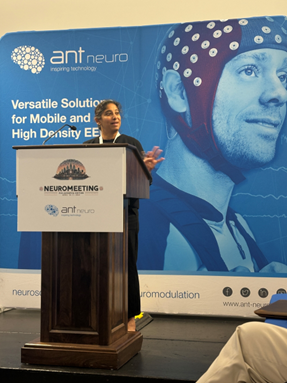
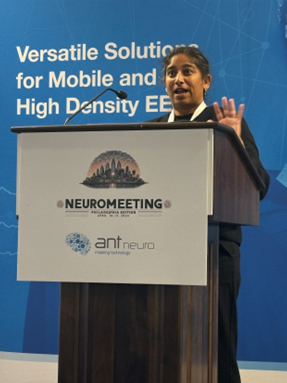
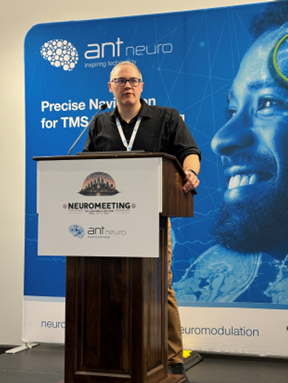
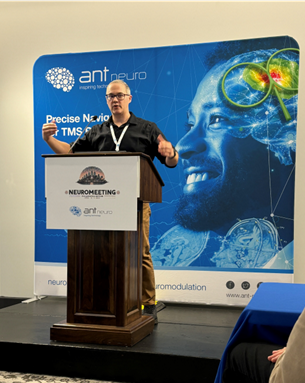
Center Highlight: Nicholas Balderston, PhD
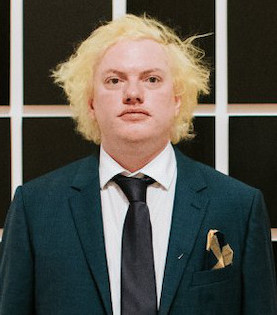 Every month, the brainSTIM Center likes to spotlight the exciting work and research going on in the labs and practices of our faculty steering committee, center scientists, and affiliated faculty members. This month’s highlight features Center Scientist Nicholas Balderston, PhD.
Every month, the brainSTIM Center likes to spotlight the exciting work and research going on in the labs and practices of our faculty steering committee, center scientists, and affiliated faculty members. This month’s highlight features Center Scientist Nicholas Balderston, PhD.
Nicholas Balderston, PhD, is an experimental psychologist with a focus in anxiety. He is a Research Assistant Professor of Psychiatry at the University of Pennsylvania, and is also an Investigator at the University of Pennsylvania’s Center for Neuromodulation in Depression & Stress. In his research, Dr. Balderston uses psychophysiology, neuroimaging, and TMS to study how the brain shapes behavior.
Dr. Balderston first became interested in neuroscience during his first brain behavior class while pursuing his BA in Psychology at the University of West Florida. Dr. Balderston’s interest was sparked by the class’ explorations into how perception and consciousness shape our everyday experience from a neuroscience perspective. Following his undergrad, Dr. Balderston went on to acquire his MS in Experimental Psychology and his PhD in Experimental Psychiatry & Neuroscience from the University of Wisconsin - Milwaukee. Throughout his graduate training and postgraduate training, Dr. Balderston cultivated his existing interests in the objective measures of behavior.
Over the course of his career, Dr. Balderston has used psychophysiology and neuroimaging to determine how the brain contributes to behavior, with a focus on the brain’s arousal during threat. His primary research focuses mostly on the examination of the mechanism in the brain that makes people anxious. As he continued his research into brain-behavior connections, Dr. Balderston determined that he needed to experimentally manipulate brain responses to test his existing hypotheses.
This determination is what led him to explore the use of transcranial magnetic stimulation (TMS) in the research and treatment of anxiety. Currently, Dr. Balderston is developing methods to increase the accuracy of TMS targeting. He also a paper in press at Neuropsychopharmacology that correlates depression symptoms with functional connectivity and attempts to identify the most efficient targets for decreasing symptoms.
Additionally, Dr. Balderston is conducting a current research effort to examine the effect of continuous theta burst stimulation (cTBS) to the right d1PFC on anxiety expression during unpredictable threat, and is also starting a new study which uses similar methods to target the parietal cortex.
When looking to the future, Dr. Balderston would like to create a two-prong research program in his lab that utilizes psychophysiology, fMRI, and TMS to develop novel ideas about anxiety, behavior, and the brain itself, as well as conducting higher impact clinical trials which would use TMS to reduce anxiety in patients. Overall, Dr. Balderston would not only like to see improvements in the use of TMS in his lab, but would like to collaborate across the University to eventually establish general principles regarding how TMS changes brain connectivity, and design treatments accordingly.
In addition to his current studies, Dr. Balderston frequently collaborates with his fellow CNDS faculty members Yvette Sheline, MD, and Desmond Oathes, PhD, who are also noted members of the brainSTIM family. He expresses an interest in collaborating with brainSTIM faculty steering committee members and his fellow center scientists, specifically with respect to e-field modeling.
To learn more about Dr. Balderston and his work with the CNDS, click here.
To get updates about the CNDS’ ongoing speaker series, click here.
MindCORE/brainSTIM Seminar: Katharine Dunlop
Date: November 1, 2024
Speaker: Katharine Dunlop, Neurosciences and Clinical Translation Keenan Research Centre Centre for Biomedical Science St. Michael’s Hospital, Toronto
Description: Aging and the Depressed Brain
Healthy aging is characterized by cognitive decline and alterations in brain structure and function. Deviations in the rate of decline in these areas may reflect accelerated aging, potentially predicting illness risk or poor prognosis. Individuals diagnosed with major depression experience a more rapid cognitive decline alongside changes in brain structure and function. However, interpreting age-related decline in this population is complicated by significant symptom and clinical heterogeneity.
My research leverages large, densely phenotyped clinical cohorts to better understand this heterogeneity, with the goal of developing precise and effective clinical interventions. In my talk, I will explore the cognitive and neuroimaging correlates of aging, and how they are altered in the context of depression. I will highlight novel applications of brain aging to understand age-related factors in depression, with a focus on executive function, suicidality, and treatment response. Lastly, I will introduce subtyping approaches as a means to better understand the complexities of aging and heterogeneity within this population.
CNDS and brainSTIM Neuromodulation and Neuroimaging Relevant to Affective Disorders Speaker Series 2024
Speaker: Sunday Francis, PhD
Title: Enhancing response through EEG-triggered-TMS: Step 1 in studying compulsivity
Date: Wednesday, December 18th, 2024 1:30pm
Speaker: Aristotle Voineskos MD, PhD, FRCP(C)
Title: Neuroimaging Approaches in Clinical Trials
Date: Wednesday, November 20th, 2024, 1:30pm
Speaker: Adam Khalifa, PhD
Title: Next-Generation Neural Interfacing Tools for Mental Health.
Date: Wednesday, October 30th, 2024, 1:30 PM
Speaker: Nicholas Trapp, MD, MS, Assistant Professor, Department of Psychiatry, University of Iowa
Title: Exploring Depression Networks with Brain Lesions, TMS, and Intracranial Electrophysiology.
Date: Wednesday, October 23th, 2024, 1:30 PM
Speaker: Greg Appelbaum, PhD Professor, Department of Psychiatry and Behavioral Sciences, University of California, San Diego
Title: The three Ps of interventional psychiatry: phenotyping, personalization, and prediction
Date: Wednesday, October 9th, 2024, 1:30 PM
Speaker: Avram Holmes, PhD Associate Professor, Department of Psychiatry, Rutgers University, Center for Advanced Human Brain Imaging Research, Brain Health Institute, Rutgers-Princeton Center for Computational Cognitive Psychiatry
Title: From Molecules to Madness: Identifying Network-Level Signatures of Psychiatric Illness Risk
Date: Wednesday, September 18th, 2024, 1:30 PM
Speaker: Marta Peciña, MD, PhD Associate Professor, Department of Psychiatry University of Pittsburgh School of Medicine, Director of the Translational Neuropsychopharmacology and Neuroimaging Lab, Western Psychiatric Institute and Clinic of UPMC
Title: Dissecting antidepressant mood-expectancy mood dynamics
Date: Wednesday, September 11th, 2024
Speaker: Michael Freedberg, PhD
Assistant Professor, The University of Texas at Austin, Kinesiology and Health Education
Title: Towards a (NIBS-Validated) Whole-Brain Mechanistic Understanding of Human Episodic and Procedural Memory
Date: Wednesday, September 4th, 2024
Speaker: Zachary Rosenthal, MD, PhD, PGY3 Psychiatry Resident, EPSP Research Track
University of Pennsylvania, School of Medicine
Title: Electroconvulsive therapy generates a hidden wave of activity after seizure in mice and humans
Date: Wednesday, August 28th, 2024
Speaker: Bernadette Gillick, PhD, MSPT, PT
Professor, Pediatrics and Development Pediatrics & Rehabilitational Medicine
Waisman Center, University of Wisconsin Madison
Title: Pediatric neuromodulation after early brain injury and stroke
Date: Wednesday, August 14th, 2024
Speaker: Emad Eskandar, Professor and Chair, Department of Neurosurgery Albert Einstein College of Medicine, Montefiore Medical Center
Date: Wednesday, August 7th, 2024, 1:30 PM
Speaker: Nirs Lipman, MD, PhD, Senior Scientist, Sunnybrook Health Sciences Centre, Toronto, Ontario
Title: Brain Circuits and Human Behaviour: What can go wrong and what can we do about it?
Date: Wednesday, July 10th, 2024
Speaker: Jean-Philippe Miron, MD, PhD, FRCPC, Assistant Professor, Psychiatry University of California, San Diego
Title: Optimizing transcranial direct current stimulation for major depression
Date: Wednesday, June 26th, 2024
Speaker: Guido van Wingen, PhD, Full Professor, Brain Imaging, Compulsivity, and Attention, Adult Psychiatry Amsterdam Neuroscience, Amsterdam, University Medical Centers
Title: Invasive brain stimulation for depression
Date: Wednesday, May 29th, 2024
Speaker: Josh Gowin, PhD, Assistant Professor, Radiology
University of Colorado, School of Medicine, Anschutz Medical Campus
Title: Development of Neural Signature of Emotion Regulation
Date: Wednesday, May 22nd, 2024
Speaker: Maital Neta, PhD, Happold Associate Professor of Psychology, University of Nebraska, Lincoln
Title: In the face of ambiguity: Mechanisms that shape individual differences in emotion perception
Date: Wednesday, May 15th, 2024
Speaker: Faranak Farzan, PhD, Chair in Technology Innovation for Youth Addiction Recovery and Mental Health
Associate Professor, School of Mechatronic Systems Engineering
Founder & Director, Centre for Engineering-Led Brain Research (eBrainLab)
Michael Smith Foundation for Health Research Scholar
Simon Fraser University, School of Mechatronic Systems Engineering
Title: 100 years of EEG in Navigating the Path toward Objective Neurotechnology in Psychiatry
Date: Wednesday, May 1st, 2024
Speaker: Colin Hoy, PhD, Professor Scholar, Neurology, University of California, San Francisco, School of Medicine
Title: Towards adaptive deep brain stimulation for motivation deficits in Parkinson's disease
Date: Wednesday, April 24th, 2024
Speaker: Fabio Ferrarelli, MD, PhD, Associate Professor of Psychiatry, University of Pittsburgh, School of Medicine
Title: TMS-assessed and TMS-modulated frontal oscillatory abnormalities in schizophrenia (SCZ) patients
Date: Wednesday, April 17th, 2024
Speaker: Molly Hermiller, PhD, Assitant Professor, Psychology Department, Florida State University
Title: Engaging the human hippocampus and memory network using concurrent TMS/fMRI
Date: Wednesday, April 10th, 2024
Speaker: Nathaniel Harnett, PhD, Assistant Professor, Department of Psychiatry, Harvard Medical School
Title: Environmental inequities and their impact on generalizable biosignatures of PTSD susceptibility
Date: Wednesday, April 3rd, 2024
Speaker: Justin Riddle, PhD, Assistant Professor, Department of Psychology, Florida State University
Title: Causal role of delta-beta coupling for goal-directed behavior: implications for treating symptoms of anhedonia
Date: Wednesday, March 20th, 2024
Speaker: Cristian Morales Carrasco, PhD, Postdoctoral Researcher, Masonic Institute for the Developing Brain, University of Minnesota
Title: Towards personalized TMS interventions using precision functional mapping and E-field modeling
Date: Wednesday, March 6th, 2024
Speaker: Matteo Fecchio, PhD, Instructor in Neurology, Research Scientist, NICC lab, Massachusetts General Hospital, Harvard University
Title: EEG responses to TMS as biomarkers for psychiatric and neurological disorders
Date: Wednesday, February 21st, 2024
Speaker: Alessio Avenanti, PhD, Full Professor, Department of Psychology "Renzo Canestrari," University of Bologna
Title: Exploring cortico-cortical plasticity: insights from information-based associative neurostimulation
Date: Wednesday, February 14th, 2024
Speaker: Immanuel Elbau, MD, PhD, Assistant Professor of Psychiatry, Department of Psychiatry, Weill Cornell Medical College
Title: Longitudinal dense sampling of a patient undergoing ECT, with ME-fMRI
Date: Wednesday, February 7th, 2024
Speaker: Ishita Basu, PhD, Research Assistant Professor, Dept of Neurosurgery, College of Medicine, University of Cincinnati
Title: Prefrontal theta oscillations evoked by a cognitive load are suppressed in brain injury but enhanced in the anxious/depressed states
Date: Wednesday, January 24th, 2024
Speaker: Rina Zelmann, PhD, Department of Neurology, Center for Neurorecovery and Neurotechnology, Massachussetts General Hospital / Harvard Medical School
Title: Brain State Modulates Stimulation Responses or Stimulation Affects Brain Signatures?
Date: Wednesday, January 17th, 2024

